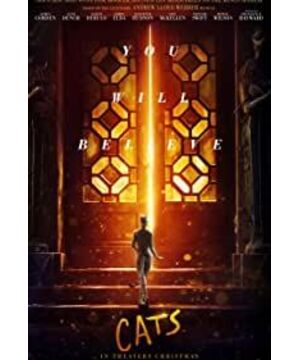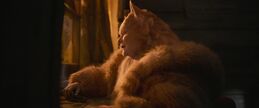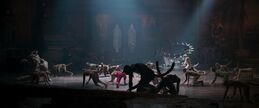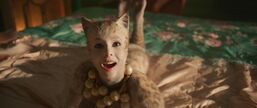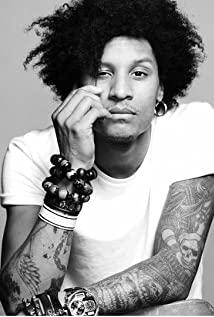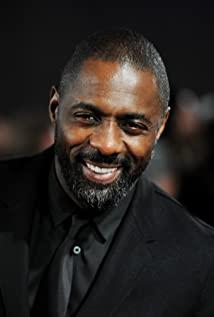One of the 20th century's greatest musical composers, Andrew Lloyd Webber, based on one of the 20th century's greatest poets, T.S. Eliot's poems, broke the stage play on Broadway, New York, USA. The longest and most frequently recorded musical "Cat" was adapted into a movie by Universal Pictures with US$100 million. However, a movie with such a strong IP went viral.
10 days after its release, the global box office was only 38.4 million US dollars, and its cost of nearly 100 million US dollars was not included in the announcement cost. Some media predict that the loss of "Cat" can reach 100 million US dollars. Previously, the studio Universal Pictures also removed it from the Oscar promotion list. In addition to the old-fashioned plot and bad adaptation, the biggest problem with this film is that it continues the setting of the original musical, where people play cats through special effects.
And in order to show the big investment, using face capture and CG, the director simulated a new species "human cat" or "cat man" in the film. In fact, this kind of similar situation has already failed. The new movie "The Lion King", which was previously expected by old fans, has caused widespread controversy. The realistic animals simulate human expressions and speak human language, which always makes people feel It's so uncomfortable. But "Cat" takes this problem to the extreme.
There are many people who come up with the so-called "uncanny valley theory" to explain. This theory was put forward by Japanese robotics expert Masahiro Mori in the 1970s and was initially applied to the theory of robot research and development. He believed that humans had an aesthetic assumption about the perception of robots and non-human objects. That is, when the similarity between robots and people reaches a certain level, people's fear of robots will also increase. This theory is derived from the 1906 paper "The Psychology of the Uncanny Valley" by German psychologist Ernst Janchi. He believes that when it is difficult to judge whether an object has vital signs, it will produce a fear of the unknown. Freud further elaborated this psychological phenomenon in his 1919 essay "The Uncanny Valley".
Before the Uncanny Valley theory was elaborated, it was fully applied in the period of mythology. Medusa and Minotaur in ancient Greek mythology, Frankenstein in literature, and monsters in early B-grade films are all terrifying creatures with extremely human-like nature. Movies are perhaps the best form of artistic expression that exemplifies the Uncanny Valley theory.
In fact, to find a reason for "Cat" to hit the street does not necessarily need such a high-level theoretical support. It may simply be because as human beings, although we like cute animals, we don't like animals that look like people.
We often use animals to describe people, such as moving like a rabbit, a deer rambling, etc. If a person has some animal characteristics, it seems to become very vivid, such as the cuteness of a deer, the intelligence of an elephant, the bravery of a lion and so on. But when we describe animals, we will not mention anything other than saying that animals are intelligent like people.
So if an animal looks like a human, will it be recognized by us? Let's look at two examples -
If it's good-looking, maybe no one will agree, but what's the reason for this?
The reason may be that if an animal looks like a human, our subjective instinct will first think it is human, and a reversal occurs, that is, he is an animal-like human, that is, he has become a monster , an outlier, for outliers, we do not accept aesthetically. Like these-
This interesting question also leads to a very easy mistake in people's daily cognition, which is "wishful thinking" . What does it mean? That is, we are often affected by cognitive habits, and reverse the main and subordinate elements of many things, just like animals look like humans, animals are the main, and looks are subordinate, but because of our human-like characteristics, in our cognition It is magnified, because we are used to looking at people, so we think animals are people, but they look like animals, and the master and slave are reversed.
What are some examples in your life? For example, a friend has always been very kind to me, and we can easily reverse the master and the slave. The Lord is a friend, and the subordinate is good to me, but we wishful thinking that being good to me is important, so we have turned being good to me into a master, and a friend has become a subordinate, that is, we must be good to me first, and then we can go Talk about the relationship as a friend.
For another example, there was a photo of Mars before, which seemed to be a human face, so some people said that there was life on Mars and built this shape. But in fact, this is the best example of "wishful inversion" . We are more accustomed to the mode of human face in our cognition, so we wishful thinking that an image is a human face, and turn a thing that is originally like a human face upside down thought they were built after human faces.
In fact, there is also what Marx said, human beings are alienated, and people are gradually dominated by external forces. Originally, the mobile phone we invented was a tool, but gradually we were dominated by this tool, that is, we turned our means upside down. , Gradually, using mobile phones to communicate is no longer the purpose, and simply playing mobile phones has become our purpose.
So it doesn't matter whether animals look like humans or not, what matters is that we should be vigilant against this "wishful thinking" . And "Cat" just ignores this common sense and imitates the stage play. No matter how it is produced, if the seeds are wrong, it will not bloom the expected flowers and bear the desired fruits.
View more about Cats reviews


